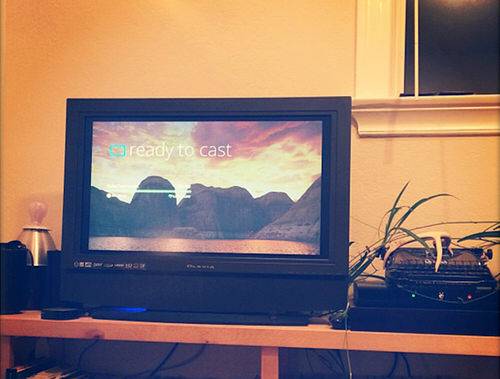
Update October 2, 2013: A new Chromecast source has joined the lineup: Hulu Plus now officially supports streaming to Google’s device. For more, visit this link.
When Google took the wraps off its little Chromecast TV streaming stick this summer, it was cute, dirt-cheap and full of promise. And now… well, at least the first two things still hold true. As for the last feature, that’s up for debate.
At the press event, Google promised that other services would eventually support Chromecast, so trusting users went ahead and purchased the device. Then they waited. And waited. They’ve been waiting for roughly two months now. Not that there has been a lack of interest. Plenty of services and developers have been exploring the possibility of Chromecast streaming since July.
Too bad most of them aren’t available for the masses who have been clamoring for them.

The State of Chromecast Streaming
From the users’ point of view, the current state of Chromecast hasn’t changed much since it was first introduced. Just as before, only four compatible streaming sources work on the device—Netflix, YouTube, Google Play Movies & TV, and Google Play Music—with tab casting only available from desktop Chrome browsers.
The lack of streaming options belies the intense interest this device has attracted. Plenty of companies and indie developers have dug into the Google Cast SDK (software developer kit), a set of tools that allow app makers to integrate Chromecast streaming, and numerous providers are expected to support it, including:
- Aereo
- Amazon Instant Video
- HBO Go
- Pandora
- PlayOn
- Plex
- Redbox Instant
- Revision3
- Vevo
- Vimeo
- aVia
See also: The Chromecast App Drought Breaks, Sort Of, As Hulu Signs on
The list of promised support goes on and on, including several network and cable channels—from CBS, NBC and ABC to specialized networks like Comedy Central, History Channel and Animal Planet. But there’s a big difference between showing interest in Chromecast streaming and implementing it, which most of these content providers haven’t actually done. Even seemingly simple tasks—like using Chromecast to watch your baby’s first steps, Grandma’s surprise birthday party or first performance of your son’s friend’s band—are still frustratingly difficult (though there are a few workarounds).
It appears to defy logic. But there is one very fundamental reason for this: Google won’t yet allow it.
The Waiting Game
The Google Cast SDK debuted alongside Chromecast in July. It has been in developer preview ever since. That means software developers can explore it, experiment with it and even build test apps with it—but they can’t release anything to the public. Not yet.

Google explains that the software developer kit just isn’t ready. Throughout previous and recent communications with the company, the Chromecast team refuses to offer details, or even vague predictions, of when the SDK will be available for production.
If history is any guide, that could be a long wait. After all, when Gmail debuted in 2004, it remained a beta (test) service for three years. Then again, Google has plenty of reason to speed the process this time. It has long battled to get into the streaming TV game—first with Google TV and related deals with television makers, and then with the doomed Nexus Q, another TV streaming device that flopped on the market.
Little wonder, then, that Google’s anxious to get it right this time. The company now has its best chance to finally capture the living room, and it doesn’t want to blow it. In a previous email, a company representative told me, “[We] want to provide a great experience for users and developers before making the SDK and additional apps more broadly available.”
But not everyone is sitting idly by. While established app makers and streaming providers politely wait for the company to open the SDK, others are charging forward—even without Google’s blessing.

The Chromecastaways
Chromecast was “rooted”—that is, hacked so developers could reprogram its core functions and evade Google restrictions—within days of its launch. Since then, Google patched the hole that made rooting possible with an update. (However, if you still have the original software and want to hack the device, you have an easy-to-use rooting tool now called FlashCast.)
See also: 5 Cool Chromecast Hacks And Workarounds
While rooting appeals to the tinkerer and hacker set, it’s a fairly technical endeavor that so far offers few payoffs for the average user. (You can’t do much more with a rooted Chromecast than you can with an unrooted one.) And that’s too bad, because what many Chromecast users want most is freedom—particularly if it enables streaming local video and music files from their computers or handhelds to their TV.
For a brief, glorious moment in August, this was possible, at least for Android users. That’s when an independent developer released an app called AllCast that allowed Android devices to transmit local media files to the streaming dongle. Unfortunately, a Google update blocked this feature—not intentionally, Google said at the time. But its changes disabled playback from external video sources, effectively hobbling the app.

Google is most likely walking a tightrope right now with Chromecast. On one hand, it finally has a popular TV device that could make it a contender in the living room. On the other, it’s balancing a number of competing interests with Chromecast, from users who want it to do everything to entertainment partners worried about piracy to developers who need to make make it all work (and who might want to launch innovative new applications as well).
In the meantime, both users and developers remain stranded, pondering an intriguing product and some highly desired features that are ready or on the verge of development, but no way to bring them together. Google, meanwhile, is actively trying to flesh out its Chromecast Developer Relations Team, which certainly suggests it plans to support some serious work on the device before long.
It will have to, if Google wants to keep its Chromecast momentum going. The competition is already heating up. Mozilla is developing its own TV streaming solution based on a Roku set-up, Sony already has its own TV dongle in the pipeline and the ever-popular Roku brand just announced a set of its own refreshed devices.
Gilligan’s Island image Chromecasted and captured from a YouTube video by nicholas blake
Corrected October 1: An earlier version of this post incorrectly stated that Chromecast had been rooted a second time. Only the original version of the software can be rooted. The text has been edited to reflect this.










